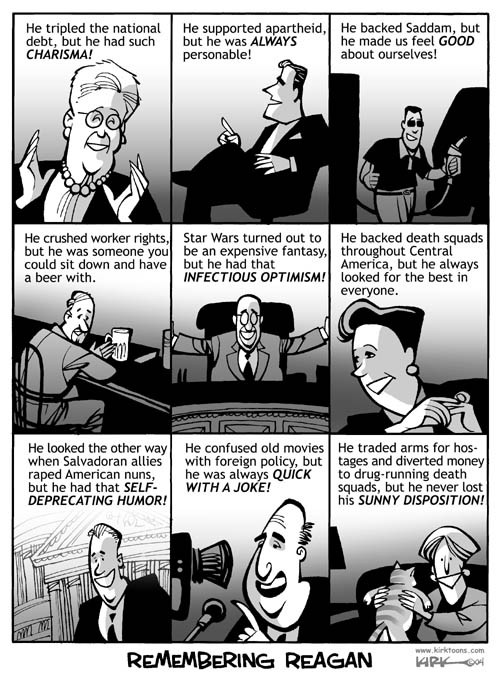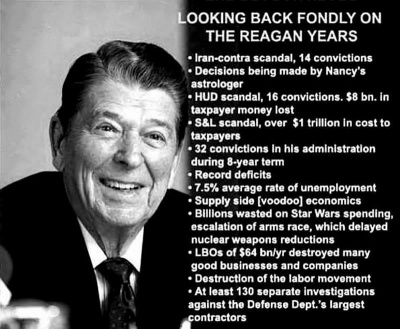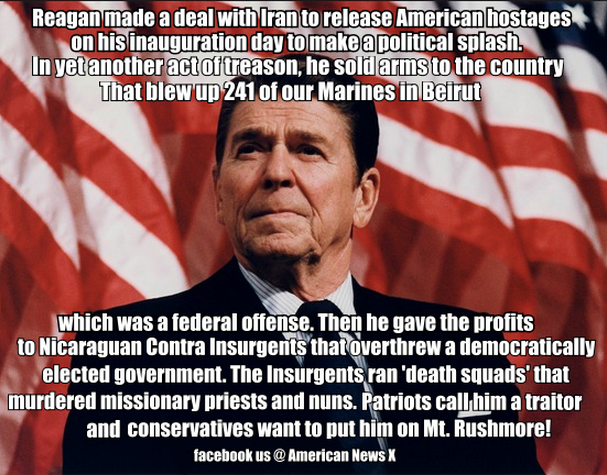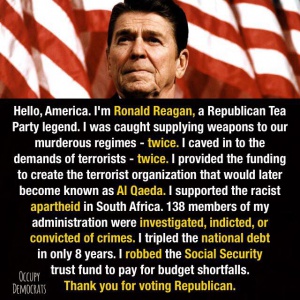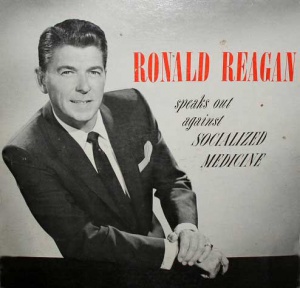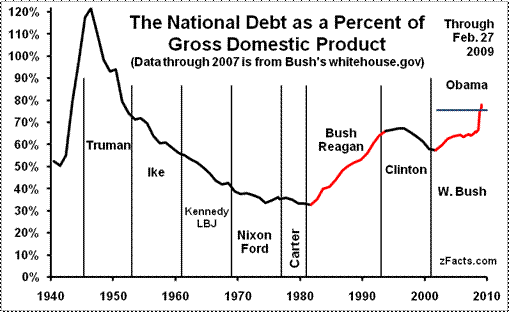Ronald Reagan
(→Reagan and energy issues) |
(→Reagan in a nutshell) |
||
| (2 intermediate revisions by one user not shown) | |||
| Line 49: | Line 49: | ||
*Reagan said he does not support citizens' rights to own an AK-47 and did not believe it was a sporting weapon.<ref>http://www.snopes.com/politics/guns/reaganak47.asp</ref><ref>https://www.youtube.com/watch?feature=player_embedded&v=nG4V_6pCLVo</ref> | *Reagan said he does not support citizens' rights to own an AK-47 and did not believe it was a sporting weapon.<ref>http://www.snopes.com/politics/guns/reaganak47.asp</ref><ref>https://www.youtube.com/watch?feature=player_embedded&v=nG4V_6pCLVo</ref> | ||
| + | |||
| + | ====Reagan and racism==== | ||
| + | |||
| + | * Ronald Reagan described African delegates to the UN as "monkeys", in newly-unearthed tapes published by a US magazine. He made the comment in a 1971 telephone call with then-President Richard Nixon. Mr Reagan, who was governor of California at the time, was angered that African delegates at the UN sided against the US in a vote. Members of the Tanzanian delegation started dancing after the UN voted to recognise China and expel Taiwan. Mr Reagan, who was a supporter of Taiwan, called the president the following day to express his apparent frustration. He said: "To see those... monkeys from those African countries - damn them, they're still uncomfortable wearing shoes!" Mr Nixon, who quit as president in 1974, can then be heard laughing. Reagan publicly defended the apartheid states of Rhodesia and South Africa in the 1970s.<ref>https://www.bbc.com/news/world-us-canada-49177034</ref> | ||
====Reagan and homosexuality==== | ====Reagan and homosexuality==== | ||
| Line 220: | Line 224: | ||
4 May 1988 During a question-and-answer session in Chicago, President Reagan revisits his 'invaders from space' notion: "I've often wondered, what if all of us in the world discovered that we were threatened by an outer -- a power from outer space, from another planet. Wouldn't we all of a sudden find that we didn't have any differences between us at all, we were all human beings, citizens of the world, and wouldn't we come together to fight that particular threat?" | 4 May 1988 During a question-and-answer session in Chicago, President Reagan revisits his 'invaders from space' notion: "I've often wondered, what if all of us in the world discovered that we were threatened by an outer -- a power from outer space, from another planet. Wouldn't we all of a sudden find that we didn't have any differences between us at all, we were all human beings, citizens of the world, and wouldn't we come together to fight that particular threat?" | ||
| + | [[File:Reagan social security.jpg|right]] | ||
====Reagan in a nutshell==== | ====Reagan in a nutshell==== | ||
| Line 271: | Line 276: | ||
*Invasion of Panama (condemned by the OAS & Geneva Conventions) to extract former CIA operative Manuel Noreiga. | *Invasion of Panama (condemned by the OAS & Geneva Conventions) to extract former CIA operative Manuel Noreiga. | ||
*Augusto Pinochet in Chile. | *Augusto Pinochet in Chile. | ||
| + | *Called African delegates at the UN "Monkeys" | ||
Concepts: | Concepts: | ||
Latest revision as of 08:44, 12 August 2019
Ronald Reagan (February 6, 1911 – June 5, 2004) was the 40th President of the United States (1981–1989) and the 33rd Governor of California (1967–1975). Born in Illinois, Reagan moved to Los Angeles, California in the 1930s, where he was an actor, president of the Screen Actors Guild (SAG), and a spokesman for General Electric (GE). His start in politics occurred during his work for GE. Originally a member of the Democratic Party, he switched to the Republican Party in 1962, at the age of 51. After delivering a rousing speech in support of Barry Goldwater's presidential candidacy in 1964, he was persuaded to seek the California governorship, winning two years later and again in 1970. He was defeated in his run for the Republican presidential nomination in 1968 as well as 1976, but won both the nomination and election in 1980.
As president, Reagan implemented bold new political and economic initiatives. His supply-side economic policies, dubbed "Reaganomics," (later called "Voodoo economics" by George H. Bush) included deregulation and substantial tax cuts implemented in 1981. In his first term he survived an assassination attempt, took a hard line against organized labor, and ordered military actions in Grenada. He was reelected in 1984. His second term was marked by the bombing of Libya and the Iran-Contra affair. The president had previously ordered a massive military buildup in an arms race with the Soviet Union, forgoing the strategy of détente. He publicly described the USSR as an "evil empire" and supported anti-Communist movements worldwide.
Reagan left office in 1989. In 1994, the former president disclosed that he had been diagnosed with Alzheimer's disease earlier in the year; he died ten years later at the age of ninety-three.
Reagan is held up as a hero in the conservative Republican movement. However, his actual record is far from exemplary. Reagan is largely credited with first implementing the concept of "supply side economics" which suggested that if we cut taxes on the rich, there will be a "trickle down" effect benefiting all aspects of society. Regan also ran up one the largest budget deficits in the history of the country at that time, and increased the national debt more than any other president before him.
Things Conservatives May Not Know/Acknowledge About Ronald Reagan
- Reagan raised taxes 11 times during his presidency.
- Reagan signed the "Therapeutic Abortion Act," into law, in an effort to reduce the number of "back-room abortions" performed in California. This legalized abortion prior to Roe v Wade.[1]
- Reagan supported gun control.[2]
Reagan and The Fairness Doctrine:
In 1987 the Supreme Court ruled that the fairness doctrine was not mandated by congress and therefore unenforceable by the FCC. In 1987 both houses of Congress voted to make The Fairness Doctrine enforceable. Reagan vetoed it and killed it. The Fairness Doctrine, among other things, mandated equal time in the media for opposing viewpoints, required news media to not ignore important news of critical interest to the community, and generally helped delineate editorial from advertising.
Reagan's responsibility for the 2000-era economic depression
“This bill is the most important legislation for financial institutions in the last 50 years. It provides a long-term solution for troubled thrift institutions. ... All in all, I think we hit the jackpot.” So declared Ronald Reagan in 1982, as he signed the Garn-St. Germain Depository Institutions Act. Traditionally, the U.S. government ran significant budget deficits only in times of war or economic emergency. Federal debt as a percentage of G.D.P. fell steadily from the end of World War II until 1980. But indebtedness began rising under Reagan; it fell again in the Clinton years, but resumed its rise under the Bush administration, leaving us ill prepared for the emergency now upon us.
The increase in public debt was, however, dwarfed by the rise in private debt, made possible by financial deregulation. The change in America’s financial rules was Reagan’s biggest legacy. And it’s the gift that keeps on taking.
The immediate effect of Garn-St. Germain was to turn the Savings and Loan industry from a problem into a catastrophe. The S.& L. crisis has been written out of the Reagan hagiography, but the fact is that deregulation in effect gave the industry — whose deposits were federally insured — a license to gamble with taxpayers’ money, at best, or simply to loot it, at worst. By the time the government closed the books on the affair, taxpayers had lost $130 billion, back when that was a lot of money.
But there was also a longer-term effect. Reagan-era legislative changes essentially ended New Deal restrictions on mortgage lending — restrictions that, in particular, limited the ability of families to buy homes without putting a significant amount of money down.
These restrictions were put in place in the 1930s by political leaders who had just experienced a terrible financial crisis, and were trying to prevent another. But by 1980 the memory of the Depression had faded. Government, declared Reagan, is the problem, not the solution; the magic of the marketplace must be set free. And so the precautionary rules were scrapped.[3]
Reagan and the metric system: A time line.
1975: The Metric Conversion Act of 1975 (Public Law 94-168) passed by Congress and the U.S. Metric Board is created.
1979: The Bureau of Alcohol, Tobacco, and Firearms (BATF) requires wine producers and importers to switch to metric.
1980: The Bureau of Alcohol, Tobacco, and Firearms (BATF) requires distilled spirits producers and importers to switch to metric.
1982: Reagan disbands U.S. Metric Board and fires everyone associated with it.
Reagan and Gun Control
- Reagan supported and signed a 15-day waiting period when he was governor of California. He then blamed it on the Democrats.
- Reagan supported and signed a law "prohibiting the carrying of loaded firearms on one's person or in a vehicle, in any public place or on any public street." The law was aimed at stopping the Black Panthers after their march on the California State Capitol, but affected all gun owners. He then blamed it on the Democrats.
- Reagan supported and signed a ban on the transfer of new manufacture fully automatic firearms while president and blamed it on the Democrats.
- Reagan vocally supported the Brady Bill and the Assault Weapons Ban after his presidency in the early 90s. Which were then blamed on the Democrats.
- Reagan said he does not support citizens' rights to own an AK-47 and did not believe it was a sporting weapon.[4][5]
Reagan and racism
- Ronald Reagan described African delegates to the UN as "monkeys", in newly-unearthed tapes published by a US magazine. He made the comment in a 1971 telephone call with then-President Richard Nixon. Mr Reagan, who was governor of California at the time, was angered that African delegates at the UN sided against the US in a vote. Members of the Tanzanian delegation started dancing after the UN voted to recognise China and expel Taiwan. Mr Reagan, who was a supporter of Taiwan, called the president the following day to express his apparent frustration. He said: "To see those... monkeys from those African countries - damn them, they're still uncomfortable wearing shoes!" Mr Nixon, who quit as president in 1974, can then be heard laughing. Reagan publicly defended the apartheid states of Rhodesia and South Africa in the 1970s.[6]
Reagan and homosexuality
Despite his own son being gay, in 1982 Reagan signed a Defense Department directive 1332.14 that stated, "homosexuality is incompatible with military service" and persons who engaged in homosexual acts or stated that they are homosexual or bisexual are to be discharged.[7]
Reagan and "Ketchup is a vegetable"
In 1981, Ronald Reagan's budget director, David Stockman, proposed classifying ketchup as a vegetable as part of Reagan's budget cuts for federally financed school lunch programs (it would make it cheaper to satisfy the requirements on vegetable content of lunches). The suggestion was widely ridiculed and the proposal was killed.
Reagan and the arms race
- Russia offered to eliminate all ballistic missiles if the U.S. would cease its "Star Wars" missile development program. Reagan refused and continued spending on this ill-fated financial boondoggle and blew the chance for disarmament.
- Reykjavík Summit: The US made progress by agreeing to reduce intermediate-range nuclear missiles in Europe, but movement toward a major arms control agreement broke down in a dispute over the U.S. space-based antimissile program, the Strategic Defense Initiative (SDI). Gorbachev argued that SDI could render Soviet nuclear forces useless, eliminating the concept of mutual deterrence and leaving his country vulnerable to attack. Reagan offered to defer deployment of SDI for ten years, but was determined to continue research and development. The deadlock prevented a major arms control agreement.[8]
Reagan and the AIDS crisis
- throughout the beginnings of the crisis, had DoHHS officials say that everything was being done that could be to combat the epidemic and no more funding was needed
- Following discovery of the first cases in 1981, it soon became clear a national health crisis was developing. But President Reagan's response was "halting and ineffective," according to his biographer Lou Cannon. Those infected initially with this mysterious disease -- all gay men -- found themselves targeted with an unprecedented level of mean-spirited hostility.
A significant source of Reagan's support came from the newly identified religious right and the Moral Majority, a political-action group founded by the Rev. Jerry Falwell. AIDS became the tool, and gay men the target, for the politics of fear, hate and discrimination. Falwell said "AIDS is the wrath of God upon homosexuals." Reagan's communications director Pat Buchanan argued that AIDS is "nature's revenge on gay men."[9]
Reagan and drugs
- Under Ronald Reagan, and the "Just Say No" campaign, the incarceration rate increased dramatically, though ironically Reagan was responsible for the introduction of crack cocaine into urban areas.[10]
Reagan and union busting
- In 1981 Air Traffic Controllers went on strike over wretched job conditions. Reagan fired the 11,345 striking air traffic controllers who had ignored the order to go back to work, and banned them from federal service for life (which was later rescinded).[11]
Reagan and energy issues
- In June, 1979, President Jimmy Carter proposed a “new solar strategy” to “move our
Nation toward true energy security and abundant, readily available energy supplies.” In an effort to set an example for the country, Carter had solar panels installed on the roof of the White House West Wing. The panels were used to heat water for the staff mess and other areas of the White House.
- At the time, President Carter warned “a generation from now, this solar heater can either be a curiosity, a
museum piece, an example of a road not taken, or it can be a small part of one of the greatest and most
exciting adventures ever undertaken by the American people; harnessing the power of the Sun to enrich our lives as we move away from our crippling dependence on foreign oil.”
- The White House solar panels were a symbol of the Carter Administration’s commitment to reduce
America’s dependence of foreign sources of energy, according to Hakes, who was the Administrator of the Energy Information Administration at the U.S. Department of Energy during the Clinton presidency. “Behind that was a whole package of tax incentives, research and development and loans that made it much more than a symbol,” Hakes added. “There was actually a very substantive attempt to move ahead the expanded use of solar energy.”
- President Ronald Reagan took the solar panels down in 1986 when the White House roof was being repaired.[1]
Sabotaging solar power
- "The budget for the [Solar Energy Research] Institute--which President Jimmy Carter had created to spearhead solar innovation--was slashed [under Reagan] from $124 million in 1980 to $59 million in 1982. Scientists who had left tenured university jobs to work [on the project] were given two weeks notice and no severance pay. The squelching of the institute--later partly re-funded and renamed the National Renewable Energy Laboratory--marked the start of Reagan's campaign against solar power. By the end of 1985, when Congress and the administration allowed tax credits for solar homes to lapse, the dream of a solar era had faded. The solar water heater President Carter had installed on the White House roof in 1979 was dismantled and junked. Solar water heating went from a billion-dollar industry to peanuts overnight; thousands of sun-minded businesses went bankrupt."
- --Arthur Allen, Prodigal Sun, as reported in Mother Jones, March/April 2000
- "After the 1973 war and the first Arab oil shock, look at what America did and what Denmark did. What we did was say, "Wow! We've got to really take on this issue." So beginning with President Ford and President Carter we said we were going to double the fuel efficiency of American cars from about 13 mpg then to I think it was 27.5. We were going to do it over ten years and we did it. We were so successful doing that we helped break OPEC in the late '70s and early '80s and crater the price of oil. That worked out so well that Ronald Reagan, when he came along, said, "That's enough of that!" He ripped off the solar panels that Jimmy Carter had put on the White House roof -- they were recently auctioned online.... Some of those solar companies that we spawned in the '70's and '80's -- they went bust also when we removed our subsidies and taxes. They were bought by Japan. I can't tell you how grateful the innovators and corporate leaders of Japan and Denmark are today for all the money America invested in research in wind and solar, spawning companies here which went bust in the '80s when we removed the subsidies from them.... One of the leading wind innovators in America, in fact, was given a medal of honor by the government of Denmark. All his technology ended up there."
- --Thomas Friedman , New York Times columnist, interviewed by Terry Gross of WHYY's "Fresh Air," about the revelations in his book, Hot, Flat, and Crowded, 8 September 2008
Ronald Reagan's cabinet choices
- James Watt, Reagan's Secretary of the Interior said, "We don't have to protect the environment, the Second Coming is at hand." and “My responsibility is to follow the Scriptures which call upon us to occupy the land until Jesus returns”
- What is the Secretary of the Interior in charge of?
- Office of Insular Affairs, National Business Center, Bureau of Indian Affairs, Bureau of Land Management, Office of Surface Mining, Bureau of Reclamation, Fish and Wildlife Service, Minerals Management Service, National Park Service, Geological Survey
- For someone who didn't seem too fond of trees, it should have come as no surprise that Ronald Reagan would appoint James Watt to be his Secretary of the Interior. James Watt was, according to the Audubon Society, "arguably the most anti-environment secretary ever." Watt was not just anti-environment, he was a simpleton. Testifying before Congress, Watt was asked if he agreed that natural resources should be preserved for future generations. His response:
- "I do not know how many future generations we can count of before the Lord returns."
- --James Watt, February 5, 1981
- However, it was not Watts' stance on environmental issues that compelled the Reagan administration to eventually force his resignation. It was the fallout from the following comment he made to a group of lobbyists regarding the makeup of his coal-leasing commission:
- "We have every kind of mix you can have. I have a black, I have a woman, two Jews and a cripple."
- --James Watt, September 21, 1983
- Eighteen days later, Watt resigned.
Cartoonist Tim Krieger on Reagan
"His legacy includes the dismantling of Franklin Roosevelt’s New Deal, the final dirty win of Management over Labor, the outsourcing of America’s manufacturing base, the embezzlement of almost all the country's wealth by 1% of its citizens, the scapegoating of the poor and black, the War on Drugs, the eviction of schizophrenics into the streets, AIDS, acid rain, Iran-Contra, and, let’s not forget, the corpses of two hundred forty United States Marines. He moved the center of political discourse in this country to somewhere in between Richard Nixon and Augusto Pinochet. He believed in astrology and Armageddon and didn't know the difference between history and movies; his stories were lies and his jokes were scripted. He was the triumph of image over truth, paving the way for even more vapid spokesmodels like George W. Bush. He was, as everyone agrees, exactly what he appeared to be—nothing. He made me ashamed to be an American. If there was any justice in this world his Presidential Library would contain nothing but boys' adventure books and bad cowboy movies, and the only things named after him would be shopping malls and Potter's Fields. Let the earth where he is buried be seeded with salt."
Reagan and the Taliban
Reagan was directly responsible for arming and training Taliban fighters, including Osama Bin Laden:
Proclamation 5034—Afghanistan Day, 1983By the President of the United States of America, 21 March 1983 The tragedy of Afghanistan continues as the valiant and courageous Afghan freedom fighters [The Taliban] persevere in standing up against the brutal power of the Soviet invasion and occupation. The Afghan people are struggling to reclaim their freedom, which was taken from them when the Soviet Union invaded Afghanistan in December of 1979. In this three-year period the Soviet Union has been unable to subjugate Afghanistan. The Soviet forces are pitted against an extraordinary people who, in their determination to preserve the character of their ancient land, have organized an effective and still spreading country-wide resistance. The resistance of the Afghan freedom fighters is an example to all the world of the invincibility of the ideals we in this country hold most dear, the ideals of freedom and independence. We must also recognize that the sacrifices required to maintain this resistance are very high. Millions have gone into exile as refugees. We will probably never know the numbers of people killed and maimed, poisoned and gased, of the homes that have been destroyed, and of the lives that have been shattered and stricken with grief. It is, therefore, incumbent upon us as Americans to reflect on the events in Afghanistan, to think about the agony which these brave people bear, and to maintain our condemnation of the continuing Soviet occupation. Our observance again this year of Afghanistan Day on March 21, the Afghan New Year, will recall for all the world America's unflagging sympathy for a determined people, its support for their refugees and commitment to achieving a political settlement for Afghanistan which will free that country from tyranny's yoke. The Congress, by Senate Joint Resolution 65, has designated March 21, 1983 as "Afghanistan Day" and has requested the President to issue a proclamation in observance of that day. Now, Therefore, I, Ronald Reagan, President of the United States of America, do hereby designate March 21, 1983 as Afghanistan Day. In Witness Whereof, I have hereunto set my hand this twenty-first day of March, in the year of our Lord nineteen hundred and eighty-three, and of the Independence of the United States of America the two hundred and seventh. Ronald Reagan |
|---|
Reagan quotes
10 Oct 1965 California gubernatorial candidate Ronald Reagan is quoted in the Fresno Bee as saying: "We should declare war on North Vietnam... It's silly talking about how many years we will have to spend in the jungles of Vietnam when we could pave the whole country and put parking strips on it, and be home by Christmas."
20 Oct 1965 California gubernatorial candidate Ronald Reagan is quoted in the Los Angeles Times as saying: "I favor the Civil Rights Act of 1964 and it must be enforced at the point of a bayonet, if necessary."
17 Jun 1966 California gubernatorial candidate Ronald Reagan is quoted in the Los Angeles Times as saying: "I would have voted against the Civil Rights Act of 1964."
16 Oct 1967 Ronald Reagan is quoted in the Los Angeles Times as saying: "I have a feeling that we are doing better in the (Vietnam) war than the people have been told."
15 May 1969 Regarding the ongoing student protests at UC Berkeley, California governor Ronald Reagan is quoted in the San Francisco Chronicle as saying: "If there has to be a bloodbath, then let's get it over with."
17 May 1976 Ronald Reagan tells Time magazine: "Fascism was really the basis for the New Deal. It was Mussolini's success in Italy, with his government-directed economy, that led the early New Dealers to say 'But Mussolini keeps the trains running on time.'"
1979 Ronald Reagan: "The American Petroleum Institute filed suit against the EPA [and] charged that the agency was suppressing a scientific study for fear it might be misinterpreted... The suppressed study reveals that 80 percent of air pollution comes not from chimneys and auto exhaust pipes, but from plants and trees."
1980 During an interview with televangelist Jim Bakker on the PTL network, presidential candidate Ronald Reagan predicts that "We may be the generation that sees Armageddon."
15 Feb 1980 Presidential candidate Ronald Reagan is quoted in the Burlington Free Press as saying: "All the waste in a year from a nuclear power plant can be stored under a desk." The claim is provably false.
14 Apr 1980 Presidential candidate Ronald Reagan is quoted in Time magazine as saying: "History shows that when the taxes of a nation approach about 20 percent of the people's income, there begins to be a lack of respect for government... When it reaches 25 percent, there comes an increase in lawlessness." The claim is provably false.
21 Apr 1980 Presidential candidate Ronald Reagan is quoted in Newsweek magazine as saying: "Because Vietnam was not a declared war, the veterans are not even eligible for the G.I. Bill of Rights with respect to education or anything." The claim is provably false.
10 May 1980 Presidential candidate Ronald Reagan is quoted in the Chicago Tribune as saying: "Trains are not any more energy efficient than the average automobile, with both getting about 48 passenger miles to the gallon." The claim is provably false.
10 Sep 1980 Presidential candidate Ronald Reagan is quoted in Sierra magazine as saying: "Approximately 80% of our air pollution stems from hydrocarbons released by vegetation. So let's not go overboard in setting and enforcing tough emissions standards from man-made sources." The claim is provably false.
9 Oct 1980 Ronald Reagan is quoted in the Los Angeles Times as saying: "Growing and decaying vegetation in this land are responsible for 93% of the oxides of nitrogen." The claim is provably false.
20 Oct 1980 Presidential candidate Ronald Reagan is quoted in Time magazine as saying: "I have flown twice over Mount St. Helens. I'm not a scientist and I don't know the figures, but I have a suspicion that one little mountain out there, in these last several months, has probably released more sulfur dioxide into the atmosphere than has been released in the last ten years of automobile driving or things of that kind." The claim is provably false.
24 Oct 1980 During a nationally-televised campaign speech, Presidential candidate Ronald Reagan declares: "Mr. Carter is acting as if he hasn't been in charge for the past three and a half years; as if someone else was responsible for the largest deficit in American history." (Carter's total deficit: $252 billion; Reagan's: $1.4 trillion)
6 Mar 1981 Ronald Reagan's second press conference held, in which names of reporters are drawn out of a jellybean jar. Those not chosen (including Associated Press and two of the Big Three TV networks) mostly boycott the conference in disgust.
23 Nov 1981 After President Reagan vetoes an emergency spending bill which would have prevented a shutdown of the federal government, House Speaker Tip O'Neill tells a reporter: "He knows less about the budget than any president in my lifetime. He can't even carry on a conversation about the budget. It's an absolute and utter disgrace."
May 1982 President Ronald Reagan declares: "In England, if a criminal carried a gun, even though he didn't use it, he was tried for first-degree murder and hung if he was found guilty."
7 Mar 1983 President Ronald Reagan tells a group of ultraconservatives that "this country is compelled by scripture and the Lord Jesus Christ to oppose Russia with all military and political means."
21 Sep 1983 Ronald Reagan's Secretary of the Interior, James Watt, describes his staff's racial diversity to the U.S. Chamber of Commerce: "We have every mixture you can have. I have a black, a woman, two Jews and a cripple. And we have talent." Watt is forced to resign 18 days later over these comments.
31 Jan 1984 President Ronald Reagan tells Good Morning America: "What we have found in this country, and maybe we're more aware of it now, is one problem that we've had, even in the best of times, and that is the people who are sleeping on the grates, the homeless who are homeless, you might say, by choice."
6 Mar 1984 Former President Jimmy Carter observes: "President Reagan doesn't always check the facts before he makes statements, and the press accepts this as kind of amusing."
30 Apr 1984 When a student at Shanghai's University of Fudan asks which life experiences best prepared him for being President of the United States, Ronald Reagan replies: "You'd be surprised how much being a good actor pays off."
4 Dec 1985 Anticipating arms control discussions with his Soviet counterpart, President Reagan draws on an extraterrestrial analogy: "[H]ow easy his task and mine might be in these meetings that we held if suddenly there was a threat to this world from some other species from another planet outside in the universe. We'd forget all the little local differences that we have between our countries ..."
21 Mar 1986 In an interview with the New York Times, President Ronald Reagan repeats his long-debunked claim: "In England, if a criminal carried a gun, even though he didn't use it, he was tried for first-degree murder and hung if he was found guilty."
17 Feb 1987 Soviet premier Mikhail Gorbachev reveals Reagan's preoccupation with space aliens: "At our meeting in Geneva, the U.S. President said that if the earth faced an invasion by extraterrestials, the United States and the Soviet Union would join forces to repel such an invasion. I shall not dispute the hypothesis, though I think it's early yet to worry about such an intrusion..."
May 1987 According to his authorized biography (published in 2000), Reagan wonders aloud about the AIDS pandemic: "Maybe the Lord brought down this plague... [because] illicit sex is against the Ten Commandments." [Dutch, p. 458]
15 Sep 1987 During a luncheon with Soviet Foreign Minister Eduard Shevardnatze in the White House, President Reagan once again wondered what would happen if the Earth were under attack from an external threat: "Don't you think the United States and the Soviet Union would be together?"
4 May 1988 During a question-and-answer session in Chicago, President Reagan revisits his 'invaders from space' notion: "I've often wondered, what if all of us in the world discovered that we were threatened by an outer -- a power from outer space, from another planet. Wouldn't we all of a sudden find that we didn't have any differences between us at all, we were all human beings, citizens of the world, and wouldn't we come together to fight that particular threat?"
Reagan in a nutshell
Criminal:
- Iran-Contra treason.
- Lied to Congress - set the standard for avoiding responsibility: "I don't recall."
- Likely encouraged Iran to keep US Embassy hostages until he was into office.
Fiscal:
- Supply-side economics (lower taxes on rich, and it will somehow "trickle-down" to the poor)
- National debt tripled.
- $12 billion trade surplus --> $100+ billion trade deficit.
- Deregulated savings and loans, precipitated huge economic crisis.
- Raised taxes eleven times.
- Taxed the poor, cut taxes for the rich.
- SDI "Star Wars" boondoggle.
- Military spending increased to match imaginary spending in USSR.
- Deregulation caused oil bust.
- Broke air traffic control union.
Social:
- Gutted social welfare.
- Dismantled the mental healthcare system.
- Release of mental patients without recourse, homeless population up.
- Ignored AIDS crisis.
- Abstinence-only sex education.
- Strengthened ATF, banned automatic weapons, blamed Democrats for it.
- Privatized the prison industry and made incarceration a profitable industry.
- Increased spending for War on Drugs.
- Increasing national drinking age from 18 to 21, then threatened to pull federal funding from states if they challenged him.
- Underfunded NEA.
- EPA Superfund grants manipulated to help Republicans in local elections.
- Deregulated kids' tv, initiated 22 minute toy ads.
- Killed energy programs (even removed solar panels from White House).
- Legalized abortion in CA as governor, prior to Roe v. Wade.
- Supported gun control
- Crack in the ghettos. (? Due to support for Contras and Noriega?)
- Though Richard Nixon created the DEA and started the "War on Drugs", Reagan and his wife kicked the campaign into a full-scale media frenzy with "Just Say No".
Foreign:
- Wars all over Central America, incl Nicaragua, El Salvador, Guatemala, Honduras.
- Promoted Iran-Iraq war.
- Sent Marines into Beirut, abandoned mission after terrorist bombing.
- Broke detente with USSR until Gorbachev personally made things better.
- Backed Contras in drug running schemes.
- Supported right-wing dictators and movements everywhere, including:
- Apartheid regime in SA.
- Marcos regime in Phillipines.
- Saddam Hussein and Baathist regime in Iraq, even after Kurds gassed.
- Taliban in Afghanistan.
- Invasion of Panama (condemned by the OAS & Geneva Conventions) to extract former CIA operative Manuel Noreiga.
- Augusto Pinochet in Chile.
- Called African delegates at the UN "Monkeys"
Concepts:
- Welfare queens.
- Trees cause pollution.
- Ketchup as a vegetable.
Appointments:
- 30+ convicted appointees.
- Ed Meese at Justice, porn freak.
- James Watt at Interior, idiot, corrupt.
- William Casey at CIA, religious nut, strikes into Afghanistan.
- HUD a corrupt mess in general.
- Politicised CIA.
- Robert Bork to SCOTUS (failed), segregationist and asshole.
- Antonin Scalia, same but he got in.
Personal:
- Unfit to serve due to Alzheimer's disease by term's end.
- Paid shill by GE and insurance industry to lobby against government healthcare.
- McCarthyite.
- Backed Moral Majority.
- Pardoned Robert Walker, who went on to kill his wife.
- Started presidential campaign at racist murder crime scene in Philadelphia, MS.
- Laid wreath and made speech at SS cemetery in Germany.
- Vietnam War a "noble cause."
- Helped start right-wing noise machine, by promoting myth of liberal media and destroying Fairness Doctrine
- Hated sex, made Ron Jr. feel like a sissy and quit ballet.
- Believed in astrology and used it to run government.
- Innovated "talking points" cue cards.
- "I don't recall" to weasel out of press questions.
- Confused movies with reality.
- Joked about bombing Russia during a mic check, which inflamed the rest of the world.
Other opinions on Reagan
Christopher Hitchens
The stupidity of Ronald Reagan.By Christopher Hitchens, Posted Monday, June 7, 2004, at 1:03 PM ET Not long ago, I was invited to be the specter at the feast during "Ronald Reagan Appreciation Week" at Wabash College in Indiana. One of my opponents was Dinesh D'Souza: He wasn't the only one who maintained that Reagan had been historically vindicated by the wreckage of the Soviet Union. Some of us on the left had also been very glad indeed to see the end of the Russian empire and the Cold War. But nothing could make me forget what the Reagan years had actually been like. Ronald Reagan claimed that the Russian language had no word for "freedom." (The word is "svoboda"; it's quite well attested in Russian literature.) Ronald Reagan said that intercontinental ballistic missiles (not that there are any non-ballistic missiles—a corruption of language that isn't his fault) could be recalled once launched. Ronald Reagan said that he sought a "Star Wars" defense only in order to share the technology with the tyrants of the U.S.S.R. Ronald Reagan professed to be annoyed when people called it "Star Wars," even though he had ended his speech on the subject with the lame quip, "May the force be with you." Ronald Reagan used to alarm his Soviet counterparts by saying that surely they'd both unite against an invasion from Mars. Ronald Reagan used to alarm other constituencies by speaking freely about the "End Times" foreshadowed in the Bible. In the Oval Office, Ronald Reagan told Yitzhak Shamir and Simon Wiesenthal, on two separate occasions, that he himself had assisted personally at the liberation of the Nazi death camps. There was more to Ronald Reagan than that. Reagan announced that apartheid South Africa had "stood beside us in every war we've ever fought," when the South African leadership had been on the other side in the most recent world war. Reagan allowed Alexander Haig to greenlight the Israeli invasion of Lebanon in 1982, fired him when that went too far and led to mayhem in Beirut, then ran away from Lebanon altogether when the Marine barracks were bombed, and then unbelievably accused Tip O'Neill and the Democrats of "scuttling." Reagan sold heavy weapons to the Iranian mullahs and lied about it, saying that all the weapons he hadn't sold them (and hadn't traded for hostages in any case) would, all the same, have fit on a small truck. Reagan then diverted the profits of this criminal trade to an illegal war in Nicaragua and lied unceasingly about that, too. Reagan then modestly let his underlings maintain that he was too dense to understand the connection between the two impeachable crimes. He then switched without any apparent strain to a policy of backing Saddam Hussein against Iran. (If Margaret Thatcher's intelligence services had not bugged Oliver North in London and become infuriated because all European nations were boycotting Iran at Reagan's request, we might still not know about this.) One could go on. I only saw him once up close, which happened to be when he got a question he didn't like. Was it true that his staff in the 1980 debates had stolen President Carter's briefing book? (They had.) The famously genial grin turned into a rictus of senile fury: I was looking at a cruel and stupid lizard. His reply was that maybe his staff had, and maybe they hadn't, but what about the leak of the Pentagon Papers? Thus, a secret theft of presidential documents was equated with the public disclosure of needful information. This was a man never short of a cheap jibe or the sort of falsehood that would, however laughable, buy him some time. The fox, as has been pointed out by more than one philosopher, knows many small things, whereas the hedgehog knows one big thing. Ronald Reagan was neither a fox nor a hedgehog. He was as dumb as a stump. He could have had anyone in the world to dinner, any night of the week, but took most of his meals on a White House TV tray. He had no friends, only cronies. His children didn't like him all that much. He met his second wife—the one that you remember—because she needed to get off a Hollywood blacklist and he was the man to see. Year in and year out in Washington, I could not believe that such a man had even been a poor governor of California in a bad year, let alone that such a smart country would put up with such an obvious phony and loon. However, there came a day when Mikhail Gorbachev visited Washington and when the Marriott Hotel—host of the summit press conferences—turned its restaurant into the "Glasnost Cafe." On the sidewalk, LaRouche supporters wearing Reagan masks paraded with umbrellas, in mimicry of Neville Chamberlain. I huddled from dawn to dusk with friends, wondering if it could be real. Many of those friends had twice my IQ, or let's say six times that of the then-chief executive. These friends had all deeply wanted either Jimmy Carter or Walter Mondale to be, presumably successively, the president instead of Reagan. They would go on to put Michael Dukakis and Lloyd Bentsen bumper stickers on their vehicles. No doubt they wish that Mondale had been in the White House when the U.S.S.R. threw in the towel, just as they presumably yearn to have had Dukakis on watch when Saddam Hussein invaded Kuwait. I have been wondering ever since not just about the stupidity of American politics, but about the need of so many American intellectuals to prove themselves clever by showing that they are smarter than the latest idiot in power, or the latest Republican at any rate.[12] |
|---|
References
- . http://en.wikipedia.org/wiki/Ronald_Reagan#cite_note-Cannon51-74
- . In a speech at George Washington University, where he was treated after being shot by John W. Hinckley, Reagan called on Congress to enact a law requiring a seven-day waiting period for the purchase of handguns. This later became the Brady Law. "I support the Brady Bill," he said in a March 28, 1991 speech, "and I urge the Congress to enact it without further delay."
- . Paul Krugman, New York Times 06/01/09 [ref]
- . http://www.snopes.com/politics/guns/reaganak47.asp
- . https://www.youtube.com/watch?feature=player_embedded&v=nG4V_6pCLVo
- . https://www.bbc.com/news/world-us-canada-49177034
- . D.O.D. Directive 1332.14, January 28, 1982; http://dont.stanford.edu/regulations/regulation41.pdf
- . Beschloss, Michael R., and Strobe Talbott. At the Highest Levels: The Inside Story of the Cold War. Boston: Little, Brown, 1993.
- . Reagan's AIDS Legacy, San Francisco Chronicle, 06/08/04 [ref]
- . http://www.mega.nu:8080/ampp/webb.html
- . http://www.dailykos.com/story/2012/07/09/1107835/-Remembering-Reagan-s-Sweet-Little-Lie-to-the-Air-Traffic-Controllers
- . http://www.slate.com/id/2101842/
See Also
- http://thinkprogress.org/2011/02/05/reagan-centennial/
- Salon: Behind the Ronald Reagan myth: “No one had ever entered the White House so grossly ill informed” [2]
| The following article is a Work In Progress. At present nobody is working on this article. If nobody is specifically working on this page, you are invited to help edit it and make it better. |
|---|
This site costs a lot of money in bandwidth and resources. We are glad to bring it to you free, but would you consider helping support our site by making a donation? Any amount would go a long way towards helping us continue to provide this useful service to the community.
Click on the Paypal button below to donate. Your support is most appreciated! |
|---|
